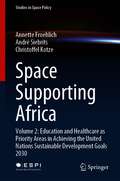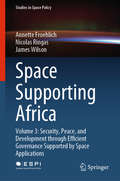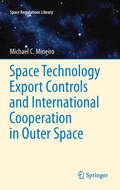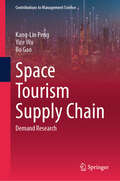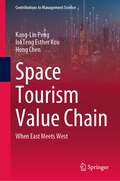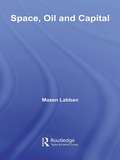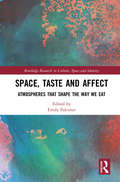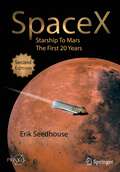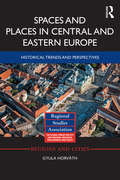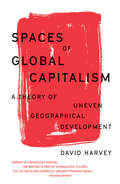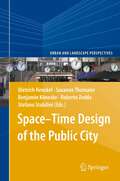- Table View
- List View
Space Supporting Africa: Volume 2: Education and Healthcare as Priority Areas in Achieving the United Nations Sustainable Development Goals 2030 (Studies in Space Policy #27)
by Annette Froehlich André Siebrits Christoffel KotzeThis book addresses the need to support decision-makers across Africa by promoting awareness of the importance of space technologies and data to African development through the presentation of existing examples where space supports education and healthcare, and by making recommendations for further roll-out of these efforts. This is necessary because of the enduring misconception that space-related research and expenditure competes with other, more pressing, needs on the continent, when in truth space can play a major role in meeting these needs.Accordingly, the book unpacks the United Nations Sustainable Development Goals (SDGs) 2030 and the critical needs they address in the African context. Secondly, it provides an analysis of the African higher education landscape and considers the network of higher education-related SDGs, their targets, and their indicators. Africa’s own development plan, Agenda 2063, is also explored. The African higher education landscape is then assessed by way of three models – the Space-Education Equation (SEE), the Benefits to Education by Space Transection (BEST), and the Enhanced Education for Sustainable Development Access and Success (EESDAS) model. The critical role of educational technologies and e-learning in bridging the educational access and success gap is appraised, as is the role of the space sector, and its technologies, applications, and data in African higher education. Finally, it explores e-health and provides an analysis of pertinent technologies required by e-health, past and present, and the opportunities and challenges it presents. Space technology can play a critical role in eliminating the barriers that are currently preventing e-health from playing a more significant role in a developing region such as sub-Saharan Africa.
Space Supporting Africa: Volume 3: Security, Peace, and Development through Efficient Governance Supported by Space Applications (Studies in Space Policy #28)
by James Wilson Annette Froehlich Nicolas RingasAfrica faces numerous challenges relating to good governance due to its vast and diverse landscape, as well as its history. This book explores the role of space-based applications in supporting African good governance by strengthening civil society, bolstering democratic processes and advancing socio-economic development. The increased use of such applications can accelerate Africa's progress towards the United Nations Agenda 2030 Sustainable Development Goals, as well as the African Union's Agenda 2063 aspirations This book examines key challenges facing governance within African to provide an accurate account of the current African context. It discusses specific examples of e-governance and digital solutions that leverage space-based technologies and have been successfully implemented in both the developed and developing world. In the context of the numerous satellite constellations being deployed to provide affordable Internet connectivity globally, it examines the major actors in this sector and presents additional governance solutions based on remote sensing and Earth observation data. Given its scope, the book will be of interest to professionals and students in the fields of development, governance and space studies.
Space Technology Export Controls and International Cooperation in Outer Space
by Michael MineiroExport controls definitively impact international cooperation in outer space. Civil and commercial space actors that engage in international endeavors must comply with space technology export controls. In the general discourse, members of the civil and commercial space community have an understanding of their domestic export control regime. However, a careful reading of the literature on space technology export controls reveals that certain questions relevant to international engagements have not been identified or answered. What is the legal-political origin of space technology export controls? How do they relate to the current international legal structure? What steps can be taken to evolve our current unilateral paradigm of space technology within the context of peaceful exploration and use of outer space? In this book, these and other relevant questions on space technology export controls are identified and assessed through an insightful case-study of the U.S. commercial communication export control regime. The findings of this case-study are used in an international legal-political analysis of international space law, public international law, and international cooperation. Breaking new ground in international legal theory, a self-justified security dilemma that is manifest in international law is identified and explained as the origin for the current paradigm of space technology export controls.
Space Tourism Supply Chain: Demand Research (Contributions to Management Science)
by Bo Gao Kang-Lin Peng Yize WuThis book studies the space tourism value chain from the perspective of demand research of space tourism. It echoes the progress of tourism demand research by tourism experts, avoids the shortcomings that arise when general tourism research methods are applied to space tourism research, and constructs innovative demand research ideas for space tourism. In the book, ten questions and one suggestion are put forward for space tourism demand research as the main discussion content of each chapter. As a demand research monograph, tourism scholars, marketing scholars and economists can understand the content of this book very well. But for all those concerned with space tourism, this book can be read to review the general tourism theories. The book makes extensive use of systematic literature review methodology, which can be used as an effective reference for research. This book opens up new dimensions for demand studies in the context of space tourism.
Space Tourism Value Chain: When East Meets West (Contributions to Management Science)
by Hong Chen Kang-Lin Peng IokTeng Esther KouThis book benefits those interested in space tourism for doing business, conducting research, and teaching space services. The value chain analysis approach is applied to construct the knowledge system of the space industry from suppliers, consumers, agents, and related stakeholders. Space tourism has made a breakthrough in travel boundaries beyond Kármán line and impacted human living in many aspects, especially a vision of Mars immigration. The tourism industry has extended its reach to outer space. Space education has been popular in many countries because of human capital to serve in the new field. Researchers have developed unique methodologies to study space economic behaviors. The advancements in space technology and commercialization have formed a new market to drive a new era of space economics. Individuals can now venture beyond the Kármán line and fulfill their desire for space exploration through space tourism. This form of tourism offers a unique opportunity for individuals to explore the origins and limitations of human beings. This book provides an overview of the current state of global space tourism development, including its characteristics, direct and indirect stakeholders, and existing challenges. The successful implementation of space tourism cases by private enterprises in Europe and the USA offers valuable insights into China's space tourism endeavors. Given China's leading position in global space technology, space tourism represents a promising commercial development field that can benefit the country and its citizens.
Space to Exhale: A Handbook for Curating a Soft, Centered, Serene Life
by Lisa HurleySay no to hustle culture, and yes to a life of ease. Lisa Hurley, Anthem Award-winning activist and founder of The Great Exhale, provides you with an inspiring and practical guide to help you beat burnout, embrace rest, and live a soft, fulfilling life. Part memoir, part manifesto, part meditation manual, Space To Exhale is a self-help book that empowers you to put your mask on first, remove your superhero cape, and create lasting life-work balance. Lisa draws on her experience as a Reiki Master, community builder, and burnout survivor, sharing anecdotes about her trials and triumphs—as well as the tools that have helped her transform. Through healing modalities like affirmations, meditations, and breathwork, as well as her powerful Exhalation Point framework, Lisa guides you on a life-changing journey to help you: Know Yourself: Remember who you are, align with your values, and celebrate your strengths. Love Yourself: Practice positive self-talk, select your close circle, and prioritize rest. Be Yourself: Show up authentically, protect your energy, and live a soft, centered, serene life. Filled with soft-life strategies and written with Lisa’s warmth, wit, and well-earned wisdom, Space To Exhale invites you to curate a life filled with joy, peace, and glimmers of delight. This transformative handbook is for anyone who is tired of feeling tired and is ready to get some rest; for Black women who are done with being the "Strong Black Woman,” and are ready to step into their Soft Black Woman era; and for everyone who is ready to live a life that truly serves their highest good. Space To Exhale is a balm for the spirit. It earns a well-deserved spot on the bookshelves of anyone seeking to curate a life filled with love, alignment, and peace—so they can move from merely surviving to vibrantly thriving.
Space, Oil and Capital (Routledge Studies In International Business And The World Economy Ser.)
by Mazen LabbanThe historical development of capital has produced a progressive increase in the demand for raw material and has consequently resulted in the concentration of capital in, and the geographical expansion of, the production of natural resources, globalizing and intensifying the competition for the control of production and markets.This book is an atte
Space, Taste and Affect: Atmospheres That Shape the Way We Eat (Routledge Research in Culture, Space and Identity)
by Emily FalconerThis book is an exploration of how time, space and social atmospheres contribute to the experience of taste. It demonstrates complex combinations of material, sensual and symbolic atmospheres and social encounters that shape this experience. Space, Taste and Affect brings together case studies from the fields of sociology, geography, history, psycho-social studies and anthropology to examine debates around how urban designers, architects and market producers manipulate the experience of taste through creating certain atmospheres. The book also explores how the experience of taste varies throughout life, or even during fleeting social encounters, challenging the sense of taste as static. This book moves beyond common narratives that taste is ‘acquired’ or developed, to emphasize the role of psycho-social histories of nostalgia, memories of childhood, migration, trauma and displacement in the experience of we eat and drink. It focuses on entrenched social dimensions of class, value and distinction instead of psychological and neuroscientific conceptualizations of taste and sensuous practices of consumption to be intrinsically linked to the experience of taste in complex ways. This book will appeal to undergraduate and postgraduate students of sociology, human geography, tourism and leisure studies, anthropology, psychology, arts and literature, architecture and urban design.
Space: The Next Business Frontier
by H. P. Newquist Lou DobbsFrom the Publisher With the collapse of the dot-com stocks, investors are anxiously considering what sector will provide the next leap forward with spectacular returns. Lou Dobbs, the best-known personality in America in broadcast financial journalism, co-founder of CNNfn and CNN's Moneyline and current twice-weekly on-air commentator for the Today Show and the Infinity Broadcasting Network on radio believes that the answer comes in five letters: SPACE. In Space: The Next Business Frontier, Dobbs and co-author HP Newquist explore where the money will go, which new technologies will emerge as winners, and which corporations and countries will win or lose. Space: The Next Business Frontier is a crucial examination of an industry which may someday dwarf the internet itself.
SpaceX, economies of scale, and a revolution in space access
by Matthew C. Weinzierl Kylie Lucas Mehak SarangFrom the time he transformed the world of online banking, Elon Musk had established himself as a bold innovator eager to challenge the status quo in hopes of, as he put it, advancing human society. After selling X.com to PayPal in 2002, he founded a series of start-ups in pursuit of that dream, starting with Space Exploration Technologies (SpaceX). Hoping to "make human life multiplanetary", Musk aimed to establish the first Mars civilization, but was unable to procure rockets that would be cheap or reliable enough to make the journey. Over the course of the next decade, SpaceX would develop a line of revolutionary rockets that transformed the commercial space launch industry. Using reusable rockets to exploit the benefits of economies of scale, SpaceX cut costs to orbit by a factor of 18 and captured a large percentage of the global launch market, once thought to be inaccessible to newcomers in the industry. But after a remarkable decade, Musk's original goal to reach Mars seemed both within reach and impossibly optimistic. SpaceX had proven technologies that would be critical in supporting a crewed mission to Mars, but the cost to get there was estimated to be well above $200 billion dollars in 2014. While revenues from the launch services market were impressive, they were nowhere near the $200 billion needed to develop a Mars civilization. Would there be enough demand for launch services to make Elon Musk's vision a possibility, or would SpaceX have to find other ways to get there?
SpaceX: Starship to Mars – The First 20 Years (Springer Praxis Books)
by Erik SeedhouseLearn about commercial spaceflight’s most successful startup in this fully updated book, which follows the extraordinary feats of engineering and human achievement that have placed SpaceX at the forefront of the launch industry and positioned it as the most likely candidate for transporting humans to Mars. This second edition emphasizes SpaceX's much-hyped manned mission to the Red Planet. With a plethora of new material gathered from 2013 to the present, the text offers the most up-to-date portrait of the maverick band of scientists and engineers producing some of the most spectacular aviation triumphs of the 21st century. Topics covered in this book include: all CRS flights, the challenges of developing retro-propulsion, and the pathway towards realizing the Falcon Heavy and BFR. In addition, the chapters describe SpaceX’s emphasis on simplicity, low-cost, and reliability, and the methods the company employs to reduce its costs while speeding up decision-making and delivery. Detailing the Falcon 1, Falcon 9 and Falcon Heavy launch vehicles, the book shows how SpaceX is able to offer a full spectrum of light, medium, and heavy lift launch capabilities to its customers and how it is able to deliver spacecraft into any inclination and altitude, from low Earth orbit to geosynchronous orbit to planetary missions. This book is the perfect go-to guide on SpaceX for anybody working or interested in the commercial space arena.
Spaceport America, Public Sector Risk-Taking, and Political Accountability (B)
by Matthew C. Weinzierl Angela Acocella Dava Newman Rebecca BrowderB case to case 723011 Sitting quietly in the heart of the New Mexico desert in the summer of 2014, Spaceport America (SA) housed little of the activity its supporters anticipated when opening its hangar doors in 2011. Despite $1 million in annual rent from Virgin Galactic, British billionaire Richard Branson's space tourism company and SA's anchor tenant, the spaceport was still heavily reliant on government funds. Flight delays and a crash on Halloween of 2014 that left one pilot dead and stalled Virgin Galactic's testing and development meant that the New Mexico Spaceport Authority (NMSA) was not receiving critical user fees to run spaceport operations. As a result, state and local taxpayers were bearing much of the cost of the underutilized spaceport, even after having invested $218 million from local and state funds. With the 2015 session of New Mexico's congress looming, the fate of the world's first "purpose-built" spaceport was in question.
Spaceport America, Public Sector Risk-taking, and Political Accountability (A)
by Matthew C. Weinzierl Angela Acocella Dava Newman Rebecca BrowderSitting quietly in the heart of the New Mexico desert in the summer of 2014, Spaceport America (SA) housed little of the activity its supporters anticipated when opening its hangar doors in 2011. Despite $1 million in annual rent from Virgin Galactic, British billionaire Richard Branson's space tourism company and SA's anchor tenant, the spaceport was still heavily reliant on government funds. Flight delays and a crash on Halloween of 2014 that left one pilot dead and stalled Virgin Galactic's testing and development meant that the New Mexico Spaceport Authority (NMSA) was not receiving critical user fees to run spaceport operations. As a result, state and local taxpayers were bearing much of the cost of the underutilized spaceport, even after having invested $218 million from local and state funds. With the 2015 session of New Mexico's congress looming, the fate of the world's first "purpose-built" spaceport was in question.
Spaces and Places in Central and Eastern Europe: Historical Trends and Perspectives (Regions and Cities)
by Gyula HorváthAcross Europe there is a rapidly changing context for undertaking regional development. In the 20th century, development of the former planned economies (Bulgaria, Czech Republic, Hungary, Poland, Romania and Slovakia), was defined by these countries differences, rather than their common ideological roots. These disparities altered over time and were marked by changing social structures. However, the ranking of regions has remained the same as core areas have strengthened their positions while the structural obstacles to the modernisation of peripheral areas have remained due to a lack of coherent regional policy. This book examines the specific regional development paths of Central and Eastern European countries and evaluates the effects of the determining factors of this process. Through analysis of the system of objectives, instruments and institutions used in different eras, and case studies of Hungary, East Germany and Germany, development models are established and compared with Western European patterns. The book summarises the experiences of Central and Eastern European regional cooperation and examines the basic nature of the cohesion problems of the Carpathian Basin trans-national macro region. It confirms by comparative historical analyses that the transformation was indeed unique. This book will make a welcome addition to the literature for students and academics interested in the broader picture of Central and Eastern European politics, future integration within the European Union and the history of regional development processes.
Spaces of Global Capitalism: A Theory of Uneven Geographical Development
by David HarveyFiscal crises have cascaded across much of the developing world with devastating results, from Mexico to Indonesia, Russia and Argentina. The extreme volatility in contemporary political economic fortunes seems to mock our best efforts to understand the forces that drive development in the world economy.David Harvey is the single most important geographer writing today and a leading social theorist of our age, offering a comprehensive critique of contemporary capitalism. In this fascinating book, he shows the way forward for just such an understanding, enlarging upon the key themes in his recent work: the development of neoliberalism, the spread of inequalities across the globe, and ‘space’ as a key theoretical concept.Both a major declaration of a new research programme and a concise introduction to David Harvey’s central concerns, this book will be essential reading for scholars and students across the humanities and social sciences.
Spaces of International Economy and Management
by Nathaniel O. Agola Rolf D. Schlunze William W. BaberA structural overview of the new field of management geography including globalization, embeddedness of MNEs, networking, hybridization, regional economies, technology, acculturation, internationalization, IHRM and implications for management and government.
Space–Time Design of the Public City
by Dietrich Henckel Benjamin Könecke Stefano Stabilini Roberto Zedda Susanne ThomaierTime has become an increasingly important topic in urban studies and urban planning. The spatial-temporal interplay is not only of relevance for the theory of urban development and urban politics, but also for urban planning and governance. The space-time approach focuses on the human being with its various habits and routines in the city. Understanding and taking those habits into account in urban planning and public policies offers a new way to improve the quality of life in our cities. Adapting the supply and accessibility of public spaces and services to the inhabitants' space-time needs calls for an integrated approach to the physical design of urban space and to the organization of cities. In the last two decades the body of practical and theoretical work on urban space-time topics has grown substantially. The book offers a state of the art overview of the theoretical reasoning, the development of new analytical tools, and practical experience of the space-time design of public cities in major European countries. The contributions were written by academics and practitioners from various fields exploring space-time research and planning.
Spacious Lawns and Long Commutes: The Irrationality of Choosing to Live in the Suburbs
by Peter A. UbelSocial scientists have discovered in the last couple of decades that people's decisions are often biased by an inability to predict what will make them happy. Many economists, however, have overlooked or underemphasized the importance of people's emotional lives in their decision-making processes. Standard economic theory, for instance, holds that if commuting is a source of unhappiness, people will choose long commutes only if they believe such commutes will raise their happiness in other ways, like bringing them higher pay or better living conditions. However, studies conducted in Germany and the U.S. have found that the longer people commute each day, the less satisfied they are with their overall lives. In this chapter, behavioral scientist Peter Ubel, explores the failure of the market to give us the neighborhoods and the commutes that we deserve. This chapter is excerpted from "Free Market Madness: Why Human Nature Is at Odds with Economics--and Why It Matters."
Spain - Culture Smart!
by Marian MeaneyCulture Smart! provides essential information on attitudes, beliefs and behavior in different countries, ensuring that you arrive at your destination aware of basic manners, common courtesies, and sensitive issues. These concise guides tell you what to expect, how to behave, and how to establish a rapport with your hosts. This inside knowledge will enable you to steer clear of embarrassing gaffes and mistakes, feel confident in unfamiliar situations, and develop trust, friendships, and successful business relationships.Culture Smart! offers illuminating insights into the culture and society of a particular country. It will help you to turn your visit-whether on business or for pleasure-into a memorable and enriching experience. Contents include* customs, values, and traditions* historical, religious, and political background* life at home* leisure, social, and cultural life* eating and drinking* do's, don'ts, and taboos* business practices* communication, spoken and unspoken"Culture Smart has come to the rescue of hapless travellers." Sunday Times Travel"... the perfect introduction to the weird, wonderful and downright odd quirks and customs of various countries." Global Travel"...full of fascinating-as well as common-sense-tips to help you avoid embarrassing faux pas." Observer"...as useful as they are entertaining." Easyjet Magazine"...offer glimpses into the psyche of a faraway world." New York Times
Spain on Screen
by Ann DaviesA collection of original essays from leading scholars in the field exploringthe contemporary debates, concerns and controversies ongoing in Spanish film industry, culture and scholarship. The essays reveal the far-reaching shifts that have occurred in the Spanish film scene, making essential reading for all interested in European cinema. "
Spain: 2001 Article IV Consultation--Staff Report; Staff Supplement; and Public Information Notice on the Executive Board Discussion
by International Monetary FundA report from the International Monetary Fund.
Spain: Can the House Resist the Storm?
by Diego CominOn September 16, 2008, President Rodriguez Zapatero recognized the severity of Spain's macroeconomic situation and clearly pointed to the culprit in front of the Spanish Congress: "Let nobody doubt it; there is already a wide consensus about the origin of the crisis: [It is] in the U.S. and its subprime mortgages." During the last eight years, Spain had gone through a phenomenal expansion that has had many important ingredients: immigration, housing boom, banking and financial market regulation, current account deficit, and productivity growth. This case analyzes how they interacted during the period 2000-2007 and what drove the Spanish recession in 2008.
Spain: Converging with the European Community
by Michel Galy Gonzalo Pastor Thierry PujolSpain's participation in European integration has strengthened its policymaking credibility and created an enviroment conducive to sustainable economic growth. Over the last decade, Spain has seen improvements in inflation, output, employment, and its balance of payments, and it has substantially reformed its product, labor, and financial markets. This paper reviews Spain's past economic performance and sees good prospects for further rises in living standards
Spain: Financial Sector Assessment Program--Detailed Assessment of the IMF Code of Good Practices on Transparency in Monetary and Financial Policies--Financial Policies
by International Monetary FundA report from the International Monetary Fund.
Spain: Selected Issues
by International Monetary FundA report from the International Monetary Fund.
